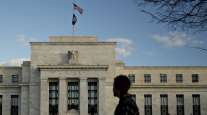IMF Communique Reveals Trade, Debt Seen as Threats to Global Growth

The global growth outlook faces rising threats from trade tensions and mounting debt despite a strengthening and “increasingly broad-based” expansion at the moment, according to a statement from world finance ministers and central bankers.
“Risks are broadly balanced in the near term but remain skewed to the downside beyond the next several quarters,” according to a communique by the International Monetary Fund’s main advisory committee, released April 21 in Washington. “Rising financial vulnerabilities, increasing trade and geopolitical tensions, and historically high global debt threaten global growth prospects.”
RELATED: Global finance chiefs told trade tensions are hitting confidence
The concerns reflect what IMF flagged this week in its updated World Economic Outlook. The fund left its forecasts for global growth at 3.9% for this year and next, while warning that threats over trade could derail the strongest upswing since 2011. It also cautioned about the record-high $164 trillion in world debt.
The language in the International Monetary and Financial Committee statement represents a ratcheting-up of pessimism since the group’s last semiannual meeting in October, and goes further in some respects than a Group of 20 statement issued in March, just as President Donald Trump ramped up trade threats against China. The communique also raises the idea that “demographic headwinds and subdued productivity growth may reduce the potential for higher and more inclusive growth going forward.”
In another change, IMFC implicitly endorsed the Federal Reserve’s interest-rate increases, saying that “monetary accommodation should continue where inflation remains weak and be gradually withdrawn where inflation looks set to return to central bank targets.”
RELATED: IMF spots trouble for global economy after 2020
The IMFC statement in October said, “Monetary policy should remain accommodative, where inflation is still below target and output gaps are negative.”
The latest statement reiterates previous language that countries “will refrain from competitive devaluations and will not target our exchange rates for competitive purposes.”
IMFC, the main advisory panel for IMF, is composed of ministers and central bank governors from about two dozen countries, including the United States and China. Policymakers are gathered in Washington for spring meetings of IMF and the World Bank.
South African Reserve Bank Gov. Lesetja Kganyago, who serves as IMFC chairman, and IMF Managing Director Christine Lagarde will discuss the committee’s stance at a press briefing in Washington on April 21.




